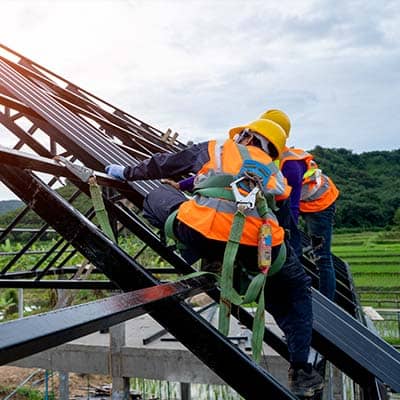
Minnesota Roofing Code and Safety
7 Energy Code, Other, Business Management Credit Hours | Video Course | Course Approval # CRSE2504-0034
This course covers energy efficiency, business practices, roofing, and construction safety.
Description
This educational offering is recognized by the Minnesota Department of Labor and Industry as satisfying seven (7) hours of credit toward Residential Building Contractor continuing education requirements including 1 hour Energy Code & 1 Hour Business Management
Instructor: Chuck Wilkins
This Course Covers:
- Energy Efficiency. Energy requirements for all aspects of energy uses in both commercial and residential construction, including heating and ventilating, lighting, water heating, and power usage for building systems not only provide a better quality of life, but also protect the environment. This one hour course will help builders identify important considerations regarding energy conservation requirements in new home construction.
- Business Practices. It is important to maintain good business practices in your contracting business. This one hour course will help aspiring builders understand appropriate licensing requirements, applicable laws to follow when conducting business, and requirements for paying and hiring employees.
- Roofing. Several sections outline the roofing requirements necessary to provide a quality roofing system typically for a consumer's home, garage or other residential application. Information regarding roofing products necessary for code compliant applications includes fastener, shingle, membrane, and roof types.
- Construction Safety. This course highlights standards related to construction safety, including standard equipment use, maintenance, and inspection requirements for ladders and scaffolds. Falls are one of the most common types of serious injuries and deaths on active jobsites. Employers are responsible for maintaining a safe working environment, but when fall protection devices are impractical, personal fall protection equipment may be used.
After completing this course participants will be able to:
- Recognize the need for alternate, energy-efficient means to the construction of residential buildings and identify new Energy Code requirements.
- Describe standards and requirements related to licensing for residential contractors, remodelers, roofers, and manufactured home installers.
- Determine employee classifications and employer requirements of state and federal workers' compensation law.
- Understand how to effectively implement fall arrest systems as required by OSHA.
- Outline the appropriate use of ladders and scaffolding.
- Explain jobsite practices to ensure proper roof replacement, maintenance, and repairs.
- Summarize various types of roofing materials, their uses, and requirements for application.
